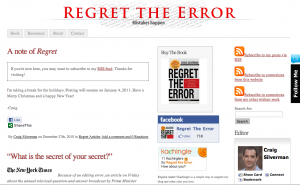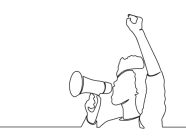Lessons to learn from 2010.
In the end, Julian Assange was not named Man of the Year by TIME magazine. Yet there’s no doubt 2010 will be remembered for the Wikileaks controversy and the resulting upheaval in the media. Particularly noteworthy were the attitudes of certain highly-respected print media outlets that played along with the game, becoming accomplices in the dissemination of information that resembled gossip more than news, and forgetting essential journalistic protocol: for instance ascertaining the originality of information, verifying sources, verifying facts, and writing with respect for and in the interest of public opinion and the reader. In his annual collection of the year’s journalistic errors, Craig Silverman shows us that journalistic lapses in judgement can make an impact even in more modest contexts.
On his blog Regret the Error, Silverman describes the misappropriation of an article published on the Web by Cooks Source, an American cooking magazine, deeming the incident 2010’s most original journalistic error. Last October Monica Gaudio, the author, was contacted by an acquaintance who mentioned seeing her article on the American tradition of apple pie baking while reading the latest edition of Cooks Source. The article appeared alongside several of Ms. Gaudio’s recipes.
Unfortunately, this came as a complete surprise to Ms. Gaudio. Cooks Source had taken her article (published on the Web a few years ago accompanied by a copyright note) without informing her. Understandably annoyed, Ms. Guadio decided to write to the editor of the magazine, Judith Griggs, to express her displeasure. The reply she received was truly fantastic. An excerpt from Ms. Griggs’ legendary response reads as follows:
“Honestly Monica, the Web is considered ‘public domain’ and you should be happy we just didn’t ‘lift’ your whole article and put someone else’s name on it!”
And
“but you as a professional should know that the article we used written by you was in very bad need of editing… We put some time into rewrites, you should compensate me! I never charge young writers for advice or rewriting poorly written pieces, and have many who write for me… always for free!”
Once the note became public, the Cooks Source offices were flooded with emails, pounded with phone calls and advertisers slowly started to pull out. Not to mention that everyone from the Los Angeles Times to the Washington Post to Forbes spread the news.
But there’s another reason Silverman awarded Cooks Source with “Error of the Year.” After careful scrutiny, it turns out that the magazine had taken 160 other articles from the Web and published them as “original” content. Perhaps more than a mistake, this was simply a case of making a habit of poor journalism. And even if the leap from apple pie to Wikileaks is truly huge, those working in the media can learn a simple message: Let’s embrace digital news and new technologies, let’s discover their full potential and learn to use the instruments they provide to the fullest. But let’s not forget who we are, where we come from, and the path we have followed to get where we are. It would be a shame, and it would not take us far.
Published in Corriere del Ticino, December 31, 2010, by Natascha Fioretti
Translated by Ann Wise
Tags: Cooks Source, Craig Silverman, Journalistic Credibility, Journalistic Errors, Judith Griggs, Julian Assange, Man of the Year, Monica Gaudio, Public Domain, Regret the Error, Verifying Sources, Wikileaks














































